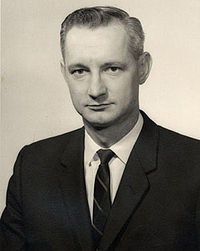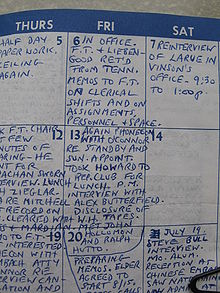- Donald Sanders
-
Donald Gilbert Sanders 
Donald G. Sanders, photographed ca. 1959 Deputy Minority Counsel for Senate Select Committee on Presidential Campaign Activities (Watergate) Committee In office
March, 1973 – September, 1974Personal details Born April 26, 1930
St. Louis, MissouriDied September 26, 1999 (aged 69)
Columbia, MissouriReligion Methodist Donald Gilbert Sanders (April 26, 1930 – September 26, 1999), was a key figure in the Watergate investigation. As Deputy Minority Counsel of the Senate Committee, he discovered Nixon's White House tapes leading to the resignation of the President. He served as an Officer (armed forces) in the United States Marine Corps, Special Agent in the Federal Bureau of Investigation, Deputy Assistant Secretary of Defense, and Director of Investigations for the United States Senate Select Committee on Intelligence.
Contents
Early life and education
Sanders was born in St. Louis, Missouri, to Anna Marie Schmitz (1908-2008) and Howard Sanders (1906-1988). He was educated at Washington University and the University of Missouri, graduating in 1954 with a law degree. [1] In 1952, he married Dolores Henderson (1932-2008) of Columbia, Missouri and they had three children; Deborah, Michael, and Matthew. Sanders was a Captain in the United States Marine Corps serving from 1954 until 1956.
FBI career
In November, 1959, Sanders completed his FBI training and was assigned to Birmingham, Alabama. He was on the team in 1961 that solved the burning of the Freedom Riders' bus by the Ku Klux Klan. [2] Sanders also arrested Victor Feguer, the last federal prisoner executed (1963) in the 20th century by the federal government.[3] In 1961 he was assigned to Miami, FL and then went to Washington D.C. in 1964 as Assistant Inspector. Sanders resigned from the FBI in 1969.
Capitol Hill
In February 1969, Sanders became the Chief Counsel and Chief of Staff of the House Committee on Internal Security, formerly the House Un-American Activities Committee. The HCIS investigated and held hearings for a number of organizations and individuals who were considered dangerous to national security.[4]
Sanders was admitted to practice law before the United States Supreme Court.
He left the HCIS in March 1972 and joined the United States Senate Select Committee on Presidential Campaign Activities (Watergate Committee) as the Deputy Minority Counsel. One of Sanders' responsibilities was to gather evidence by interviewing officials and aides to find out more information about the Watergate break-in. The most famous of these interviews occurred on Friday, July 13, 1973. Federal Aviation Administration head, Alexander Butterfield, was being privately questioned by Senate committee staff members, when Sanders asked if it were possible that a recording system had been used in the White House. Mr. Butterfield (a former White House aide) answered, "I wish you hadn't asked that question, but, yes, there is." [5] Sanders went to relay the news to Fred Thompson, who was the Minority Counsel. Sanders first had to call him out of a local restaurant. "Because he was with some reporters, I got him away from them, and got him out on the street corner and told him the story," Sanders said. [6]
On Monday, July 16, 1973, during the televised hearings, Thompson publicly asked, "Mr. Butterfield, are you aware of the installation of any listening devices in the Oval Office of the president?" The revelation of cover up on the taping system in the Oval Office led the House Judiciary Committee to submit three articles of impeachment for obstruction of justice, abuse of power, and contempt of congress. When the final article was approved July 30, 1974, Richard Nixon resigned on August 9, 1974.
Later years
Afterwards, Sanders worked as a Senior Program Analyst for the Atomic Energy Commission and Deputy Assistant Secretary of Defense for Legislative Affairs (Ford administration). In the latter position, he received the Distinguished Civilian Service Award, the department's highest recognition. He returned to the Hill as Director of Investigations for the Senate Select Committee on Intelligence and then worked for the Senate Select Committee on Ethics.
Sanders retired from national service in 1982 and returned to practice law in Columbia, Missouri. He was elected as Boone County Commissioner in 1988, and served until 1990. He completed an MA in History from the University of Missouri in 1991. Sanders was President of the Boone County Historical Society. He and his family donated land to Boone County where Nathan Boone blazed the Booneslick Trail across central Missouri. Sanders also served as Chairman of the Administrative Board of Midway Locust Grove United Methodist Church. On September 26, 1999, Sanders died of cancer at the age of 69.[7]
See also
References
- ^ "Select Chronology for Donald G. Sanders" (HTML). University of Missouri Archives. December 13, 2006. http://muarchives.missouri.edu/c-rg22-s41-chron.html.
- ^ Former Special Agents (1998). Society of Former Special Agents of the FBI. Turner Publishing Company. pp. p 219. ISBN 1563114739.
- ^ "Federal Executions 1927-2003" (HTML). General Services Administration. Death Penalty Information Center. October 12, 1993 (with updates by DPIC). http://www.deathpenaltyinfo.org/article.php?scid=29&did=149.
- ^ "UMC; Student Life and Activities; Prominent Alumni; Donald Sanders Papers" (HTML). University of Missouri Archives. 1979. http://muarchives.missouri.edu/c-rg22-s41.html.
- ^ Honan, William H. (September 29, 1999). "Donald G. Sanders Dies at 69; Brought Nixon Taping to Light" (HTML). The New York Times. http://query.nytimes.com/gst/fullpage.html?res=9406E3DE173EF93AA1575AC0A96F958260.
- ^ Overby, Peter (November 5, 2007). "Thompson's Watergate Role Not as Advertised" (HTML). National Public Radio. http://www.npr.org/templates/story/story.php?storyId=16019179.
- ^ "Milestones" (HTML). TIME Magazine. October 11, 1999. http://www.time.com/time/magazine/article/0,9171,992224,00.html.
External links
- Archives of the University of Missouri - ' Donald Sanders' Papers'
Categories:- United States Senate lawyers
- Watergate figures
- University of Missouri alumni
- People from Columbia, Missouri
- People from St. Louis, Missouri
- American Methodists
- 1930 births
- 1999 deaths
Wikimedia Foundation. 2010.

